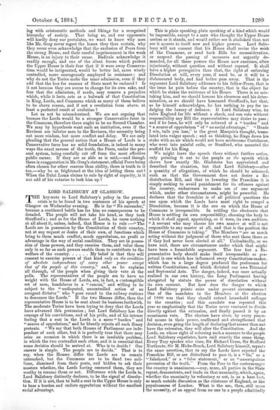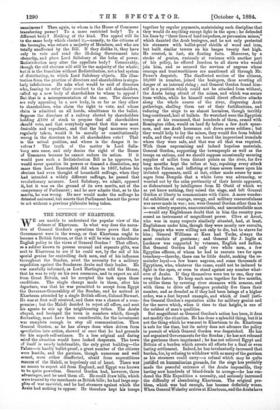LORD SALISBURY AT GLASGOW.
THE key-note to Lord Salisbury's policy in the present crisis is to be found in two sentences of his speech at Glasgow on Wednesday evening. He is for "No surrender," because a continued battle has for him no consequences to be dreaded. The people will not take his head, as they took Strafford's ; and as for the House of Lords, he cares nothing at all about it, unless, indeed, that House is to rule :—" The Lords are in possession by the Constitution of their country, not at any request or desire of their own, of functions which bring to them much conflict, much opprobrium, no profit or advantage in the way of social condition. They are in posses- sion of these powers, and they exercise them, and value them only in so far as such powers enable them to contribute to the welfare of the country My belief is that they will consent to exercise powers of that kind only on the condition of absolute independence of every other power except that of the people of this country," and, as he explains all through, of the people when giving their vote at the polls. The representatives of the people are to have no weight with the House of Lords, are, in fact, a contemptible set of men, bondslaves to a "caucus," and willing to be subject to the "undisputed, uncontrolled action of an arrogant dictator" who "goes round to the railway stations to denounce the Lords." If the two Houses differ, then the representative House is to be sent about its business forthwith. The moderate Tories have been trying to deny that the Lords have advanced this pretension ; but Lord Salisbury has the courage of his convictions, and of his pride, and of his intense feeling that a seat in the Lords is a mere " burden" and "source of opprobrium," and he bluntly rejects all such flimsy pretexts. "We say that both Houses of Parliament are inde- pendent of each other, but it is perfectly true that there may arise an occasion in which there is an insoluble problem, in which the two contradict each other, and it is essential that some decision should be arrived at. Who is to decide ? Our answer is simple. The people are to decide." That is to say, when the Houses differ the Lords are to remain untouched, but the Commons are to be fined two mil- lions, dismissed from their posts, and bidden to ask their masters whether, the Lords having censured them, they are worthy to resume them or not. Difference with the Lords is, Lord Salisbury distinctly declares, to be the signal of dissolu- tion. If it is not, then to hold a seat in the Upper House is only to bear a burden and endure opprobrium without the smallest social advantage.
This is plain speaking, plain speaking of a kind which would be impossible, except to a man who thought the Upper Howie useless as it stands, and would rather see it abolished than not see it accrete to itself new and higher powers. Lord Salis- bury will not consent that his House shall revise the vgirk of the Commons, or send back Bills for reconsideration, or suspend the passing of measures not urgently de- manded, for all these powers the House now exercises, often injuriously, without question and without reproof. It shall have a higher prerogative than that, the right of enforcing Dissolution at will, every year, if need be, or it will be a dishonoured body, and had better pass away. That is the argument Lord Salisbury addresses to his fellow-Peers that Is the issue he puts before the country, that is the object for which he stakes the existence of his House. There is no mis- taking him, and we should honour his clearness and his deter- mination, as we should have honoured Strafford's, but that, as he himself acknowledges, he has nothing to pay for in- dulging the luxury of defiance. If Lord Salisbury wins, he rules England for life without a check, and can veto without responsibility any Bill the representatives may desire to pass; and if he loses, he will only be relieved of a " burden ' and "a source of opprobrium" of "no social advantage." "Heads I win, tails you lose," is the great Marquis's thought, trans- lated into vulgar speech ; and so thinking, he flings down his stake with an air which would not have misbecome Coriolanns, who went into painful exile, or Strafford, who mounted the scaffold for his King.
We might leave the speech there without further notice, only pointing it out to the people as the speech which shows how exactly Mr. Gladstone has appreciated and described the situation, but that Lord Salisbury—after a quantity of allegations, of which he should be ashamed, such as that the Government does not desire a Re- distribution Bill, and that in lowering the Franchise it is simply seeking to avoid punishment for its offences against the country, endeavours to make use of one argument which, under other circumstances, might be powerful. He declares that the franchise is of all political questions the one upon which the Lords have most right to compel a Dissolution, because it is the one on which the House of Commons is irresponsible. In settling the electorate that House is settling its own responsibility, choosing the body to which it shall appeal, appointing, as it were, its own auditors. "A servant who may choose his own master at will is not responsible to any master at all, and that is the position the House of Commons is taking." The Members "are as much acting without the judgment of those who sent them there as if they had never been elected at all." Undoubtedly, as we have said, there are circumstances under which that might have been a formidable argument. The fear lest a Re- presentative body should make itself irresponsible or per- petual is one which has influenced every Constitution-maker, which has in a large degree produced the preference for written Constitutions, and which dictated our own Triennial and Septennial Acts. The danger, indeed, was once actually realised in our own history, the Long Parliament having abrogated by statute the power of dissolution without its own consent. But how does the danger to which Lord Salisbury points arise under present circumstances ? One of the mandates to the Members at the election of 1880 was that they should extend household suffrage to the counties ; and this mandate was repeated this year so emphatically that the Tories never ventured to divide directly against the extension, and finally passed it by an unanimous vote. The electors have since, by every peace- ful means in their power, reaffirmed and strengthened that decision, even going the length of declaring that sooner than not have the extension, they will alter the Constitution. And the
Lords' on whose right of referring such a measure to the people
Lord Salisbury expatiates, have said exactly the same thing. Every Tory speaker who rises, Sir Richard Cross, Sir Stafford Northcote. Sir M. Hicks-Beach, Lord Salisbury himself, repeats the same assertion, that to say the Lords have rejected the Franchise Bill, or are disinclined to pass it, is a "lie," or a "falsehood," or a "false statement," or an "unscrupulous perversion of the truth." From the Peer to the costermonger the country is unanimous,—nay, more, all parties in the State repeat, demonstrate, and trade on that unanimity, which, again, whether the unanimity be voluntary or not, is, as a bare fact, as much outside discussion as the existence of England, or the
populousness of London. What is the use, then, still more the necessity, of an appeal from no one to a people admittedly
unanimous I Then again, to whom is the House of Commons transferring power? To a more restricted body? To a different body Nothing of the kind. The appeal will lie to -the same body which elected it,—namely, to the citizens of the boroughs, who return a majority of Members, and who are totally unaffected by the Bill. If they dislike it, they have only to vote and send the ill-doing Government into obscurity, and place Lord Salisbury at the helm of power. Redistribution may alter the appellate body? Conceivably, though the old electors will still be the majority of the whole; hut it is the franchise without Redistribution, not a bad system of distributing, to which Lord Salisbury objects. His illus- tration from the practice of directors and shareholders is singu- larly infelicitous. He asks what would be said of directors who, fearing to refer their conduct to the old shareholders, called up a new body of shareholders to whom to appeal ? But that is a misrepresentation of the case. The directors are only appealing to a new body, in so far as they allow to shareholders, who claim the right to vote, and whose claim is admitted on all hands, admittance to the ballot.
oppose the directors of a railway elected by shareholders holding £100 of stock to propose that all shareholders should vote, and that everybody agreed that this was most desirable and expedient, and that the legal measures were regularly taken, would it be morally or constitutionally wrong in the directors to let all shareholders vote? That is the actual position, and where is the danger it in- volves? The truth of the matter is Lord Salis- bury sees none, and only denies the right of the House of Commons because he cannot endure its action. If it would pass such a Redistribution Bill as he approves, he would never question its powers or demand a dissolution, any more than Lord Beaconsfield did when in 1867, before his electors had even thought of household suffrage, when they had intended a widely different suffrage, he passed that revolutionary measure. Lord Salisbury, we admit, opposed it„ but it was on the ground of its own merits, not of the competency of Parliament ; and he now admits that, as to the merits, he was wrong. He now would make the suffrage he detested universal, but asserts that Parliament has not the power to act without a previous plebiscite being taken.















































 Previous page
Previous page